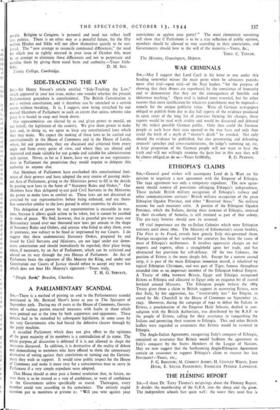SIDE-TRACKING THE LAW
Sin,—Sir Henry Slesser's article entitled " Side-Tracking the Law," which appeared in your last issue, makes one wonder whether the present Parliamentary procedure is constitutional. The British Constitution is not a written constitution, and it therefore can be stretched to a certain extent without breaking. It is, I suggest, now being stretched by our elected Members of Parliament to such an extent that unless reforms take place it is bound to snap and break down. Our representatives are elected by us and given power to mould, on our behalf, the legislation of the country. We give them power to make laws and, in doing so, we agree to keep any constitutional laws which they may make. We expect the making of these laws to be carried out constitutionally in the House of Commons and in the House of Lords, where, kir our protection, they are discussed and criticised from every angle and from every point of view, and where they are altered and improved and made suitable for our people and suitable for administration with justice. Never, as far as I know, have we given to our representa- tives in Parliament the permission they would require to delegate this authority to anyone else.
Our Mernbers of Parliament have overlooked this constitutional limi- tation of their powers and have adopted the easy course of passing skele- ton Acts of Parliament, giving to the Ministries power to fill in the details by passing new laws in the form of " Statutory Rules and Orders." Our Members have thus delegated to our paid Civil Servants in the Ministries the power to make laws to control us. These laws are not discussed or criticised by our representatives before being enforced, and are there- fore somewhat similar to the laws passed in other countries by dictators.
This delegation of power by our representatives is excusable in war- time, because it allows quick action to be taken, but it cannot be justified in times of peace. We find, however, that in peaceful pre-war years our Bureaucracy issued over one thousand new laws per annum in the shape of Statutory Rules and Orders, and anyone who failed to obey them, even in ignorance, was subject to be fined or imprisoned by our Courts. I do suggest that these undemocratic Statutory Orders, prepared by and issued by Civil Servants and Ministers, are not legal under our demo- cratic constitution and should immediately be repealed, their place being taken, if necessary, by an Act of Parliament, which, can be criticised and altered on its way through the two Houses of Parliament. An Act of Parliament bears the signature of His Majesty the King, and under our Constitution our Courts of Justice should refuse to accept any'ffiew law which does not bear His Majesty's signature.—Yours truly,


























 Previous page
Previous page